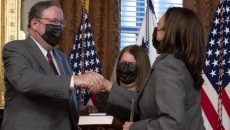Canada's two largest provinces responded Thursday to the increasing threat of the COVID-19 Omicron variant as health experts urged booster shots would be an important strategy to hold surging infections at bay.
"We do have a tremendous amount on which to base hope, not least of which are the vaccines," said Dr. Adalsteinn Brown, co-chair of Ontario’s science table, a group of experts that advise the province on the pandemic.
"But it must be hope built on action. Anything we can do now — whether as an individual or a province — can help."
Brown warned that the Omicron variant is an incredible threat that could lead to "the worst wave of the pandemic yet." Public health measures must cut contacts in half if the province is to avoid having 10,000 daily cases before the holiday season, he said.
Ontario reported 2,421 daily cases — its highest since mid-May. It also had nine more COVID-19 deaths, pushing Canada past a grim milestone of more than 30,000 deaths since the pandemic began.
Brown said Omicron is dramatically more transmissible than any other COVID-19 variant. It requires a quick and extensive response, including a "circuit breaker," until people can get their booster vaccine dose, he said.
"There is an incredible urgency because of the speed of which it spreads."
Canada's chief public health officer, Dr. Theresa Tam, wrote in an annual report on the state of public health in the country that the pandemic has exposed long-standing cracks in the system.
"The public health system lacks the necessary resources and tools to carry out its critical work and is the subject of 'boom and bust' funding cycles that leave us ill-prepared in the face of new threats," Tam wrote.
5/5 But with the fastest spreading variant to date, >7 million not fully vaccinated in Canada + others with underlying conditions or not yet eligible for boosters and a strained and exhausted health workforce, there is much to protect. ➡️ https://t.co/w27G7rHASE
— Dr. Theresa Tam (@CPHO_Canada) December 16, 2021
The report said it is too early to know how the new variant will affect Canada's pandemic response.
Health officials across the country are weighing additional measures to deal with the Omicron threat as infections rise significantly.
Premier Francois Legault was to announce new restrictions in Quebec, which reported 2,736 new daily infections — its highest tally in 11 months.
Legault called the situation critical in a post on Twitter.
The Quebec government's health-care research institute said it expected more than 700 hospitalizations in the province, and more than 160 people in intensive care, within two to three weeks.
Canada surpassed 25,000 COVID-19 deaths in May and vaccination efforts across the country slowed the deadly pace.
With the emergence of the Omicron variant, COVID-19 modelling shows infections could rapidly increase and health experts warned more hospitalizations and deaths could follow.
In Saskatchewan, Premier Scott Moe urged residents to conduct themselves with caution. But, he added, it doesn't mean they have to stay home.
Moe also encouraged residents to use rapid test kits before gathering for the holidays.
Saskatchewan decided Thursday to open booster shots to all eligible residents over the age of 18 starting Monday. The time required between the second and third doses was reduced to three months from five.
Moe said case numbers in the province are reasonable at the moment, but he added his government is preparing for the Omicron variant.
"I would like nothing more to never talk about COVID again, but I also know that we're being faced with yet another challenge here," he said.
"I just once again would say that Saskatchewan people are much stronger than this virus and we are going to find our way through it."






